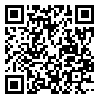Thu, Apr 25, 2024
Volume 30, Issue 3 (6-2020)
JHNM 2020, 30(3): 182-190 |
Back to browse issues page
Download citation:
BibTeX | RIS | EndNote | Medlars | ProCite | Reference Manager | RefWorks
Send citation to:



BibTeX | RIS | EndNote | Medlars | ProCite | Reference Manager | RefWorks
Send citation to:
Nickbin Poshtamsary S, Emami Sigaroudi A, Farmanbar R, Radafshar G, Atrkar Roushan Z. The Effect of Educational Intervention Based on the Health Belief Model on Oral and Dental Health Behavior
in Pregnant Women. JHNM 2020; 30 (3) :182-190
URL: http://hnmj.gums.ac.ir/article-1-1410-en.html
URL: http://hnmj.gums.ac.ir/article-1-1410-en.html
Sahar Nickbin Poshtamsary1 

 , Abdolhosein Emami Sigaroudi *
, Abdolhosein Emami Sigaroudi * 

 2, Rabiollah Farmanbar3
2, Rabiollah Farmanbar3 

 , Golpar Radafshar4
, Golpar Radafshar4 

 , Zahra Atrkar Roushan5
, Zahra Atrkar Roushan5 




 , Abdolhosein Emami Sigaroudi *
, Abdolhosein Emami Sigaroudi * 

 2, Rabiollah Farmanbar3
2, Rabiollah Farmanbar3 

 , Golpar Radafshar4
, Golpar Radafshar4 

 , Zahra Atrkar Roushan5
, Zahra Atrkar Roushan5 


1- Ph.D. Candidate, Department of Nursing, School of Nursing and Midwifery, Guilan University of Medical Sciences, Rasht, Iran
2- Associate Professor, Department of Nursing, Social Determinants of Health Research Center (SDHRC), School of Nursing and Midwifery, Guilan University of Medical Sciences, Rasht, Iran. , emamisig@gums.ac.ir
3- Associate Professor, Department of Nursing, Social Determinants of Health Research Center (SDHRC), School of Nursing and Midwifery, Guilan University of Medical Sciences, Rasht, Iran
4- Associate Professor, Department of Periodontology, Dental Sciences Research Center, School of Dentistry, Guilan University of Medical Sciences, Rasht, Iran
5- Associate Professor, Biostatistics, Social Determinants of Health Research Center (SDHRC), School of Nursing and Midwifery, Guilan University of Medical Sciences, Rasht, Iran
2- Associate Professor, Department of Nursing, Social Determinants of Health Research Center (SDHRC), School of Nursing and Midwifery, Guilan University of Medical Sciences, Rasht, Iran. , emamisig@gums.ac.ir
3- Associate Professor, Department of Nursing, Social Determinants of Health Research Center (SDHRC), School of Nursing and Midwifery, Guilan University of Medical Sciences, Rasht, Iran
4- Associate Professor, Department of Periodontology, Dental Sciences Research Center, School of Dentistry, Guilan University of Medical Sciences, Rasht, Iran
5- Associate Professor, Biostatistics, Social Determinants of Health Research Center (SDHRC), School of Nursing and Midwifery, Guilan University of Medical Sciences, Rasht, Iran
Abstract: (2103 Views)
Introduction: The World Health Organization recognizes oral health as an integral part of
public health and believes that untreated oral diseases may greatly affect the quality of life,
especially in pregnant mothers who should maintain their health and their babies’ health.
Objective: This study aimed to determine the effect of educational intervention based on a
health belief model on oral and dental health behavior in pregnant women.
Materials and Methods: In this randomized clinical trial, 110 pregnant mothers attending
15 health centers in Rasht City, Iran (a total of 33 centers) were randomly allocated to
case and control groups. After the analysis of pretest data (collected using a psychometric
questionnaire), an intervention was designed and executed based on the Health Belief
Model (HBM). Post-test was administered three months after the intervention and
the obtained data were analyzed by using the Chi-square and independent and linear
regression test.
Results: The majority of the mothers in the case (83.6%) and control (89.1%) groups were 18-
30 years old and most mothers in the case (45.5%) and control (58.2%) groups had high school
education. The Mean±SD score of awareness, different constructs of HBM, and performance
increased significantly in the case group after the intervention (P<0.05). The Mean±SD score
of performance was 35.45±12.52 in the case group before the intervention and it increased
to 77.26±9.33 three months after the intervention (P<0.05).
Conclusion: The results showed that intervention based on this model enhanced oral and
dental health behaviors. The results also suggested that the mothers lacked adequate
awareness and had a poor performance in adopting oral and dental health behaviors. This
model can be used as a framework for designing and implementing educational interventions
to decrease dental caries
public health and believes that untreated oral diseases may greatly affect the quality of life,
especially in pregnant mothers who should maintain their health and their babies’ health.
Objective: This study aimed to determine the effect of educational intervention based on a
health belief model on oral and dental health behavior in pregnant women.
Materials and Methods: In this randomized clinical trial, 110 pregnant mothers attending
15 health centers in Rasht City, Iran (a total of 33 centers) were randomly allocated to
case and control groups. After the analysis of pretest data (collected using a psychometric
questionnaire), an intervention was designed and executed based on the Health Belief
Model (HBM). Post-test was administered three months after the intervention and
the obtained data were analyzed by using the Chi-square and independent and linear
regression test.
Results: The majority of the mothers in the case (83.6%) and control (89.1%) groups were 18-
30 years old and most mothers in the case (45.5%) and control (58.2%) groups had high school
education. The Mean±SD score of awareness, different constructs of HBM, and performance
increased significantly in the case group after the intervention (P<0.05). The Mean±SD score
of performance was 35.45±12.52 in the case group before the intervention and it increased
to 77.26±9.33 three months after the intervention (P<0.05).
Conclusion: The results showed that intervention based on this model enhanced oral and
dental health behaviors. The results also suggested that the mothers lacked adequate
awareness and had a poor performance in adopting oral and dental health behaviors. This
model can be used as a framework for designing and implementing educational interventions
to decrease dental caries
Article Type : Research |
Subject:
Special
Received: 2020/07/4 | Accepted: 2020/07/4 | Published: 2020/07/4
Received: 2020/07/4 | Accepted: 2020/07/4 | Published: 2020/07/4
Send email to the article author
| Rights and permissions | |
 | This work is licensed under a Creative Commons Attribution-NonCommercial 4.0 International License. |



